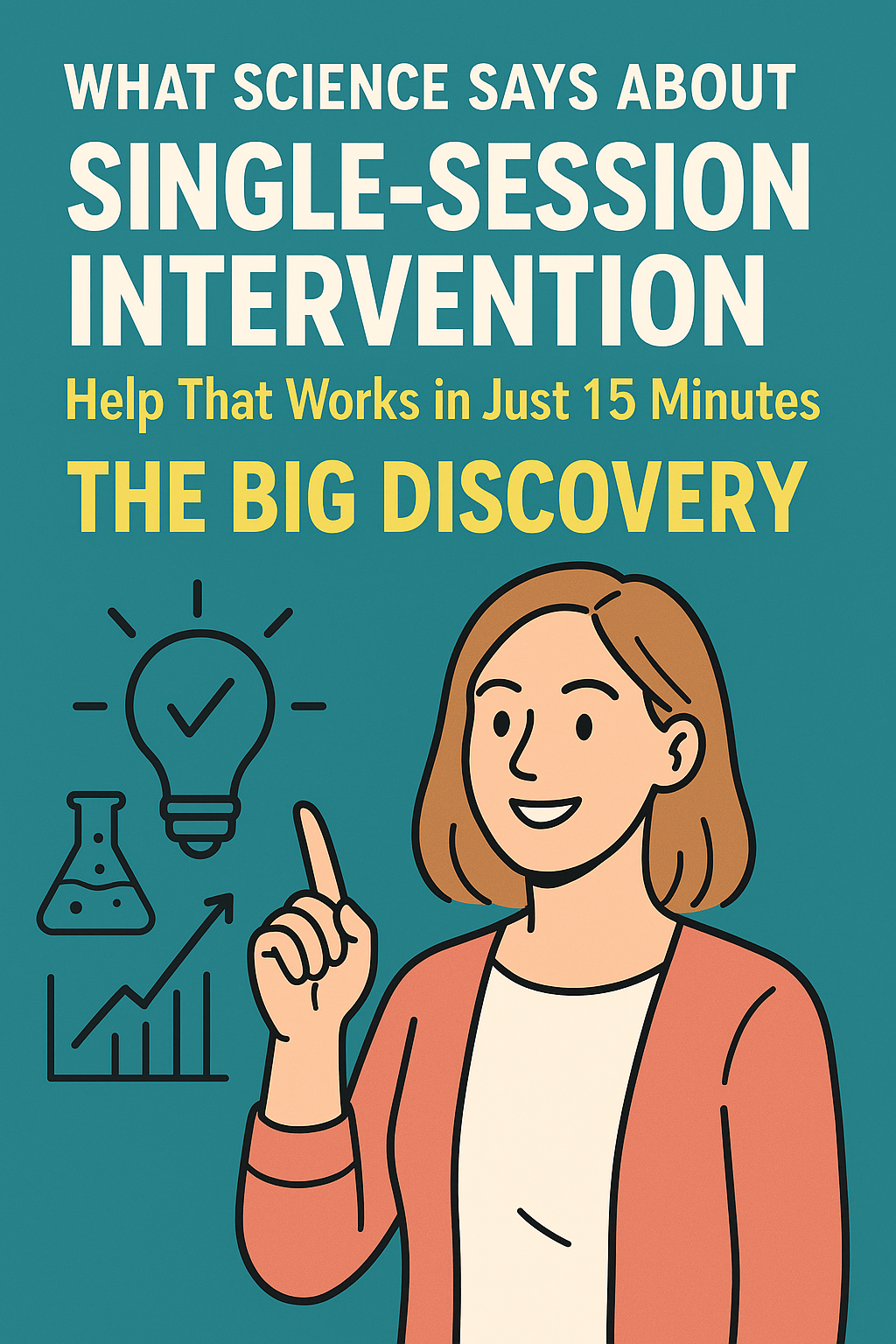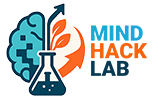What Science Says About Single-Session Intervention

Have you ever had one of those conversations that completely shifted how you see things? Maybe it was a chat with a friend who helped you realize you'd been stuck in a mental loop, or a moment of clarity that suddenly made a problem seem manageable. That's the essence of what single-session interventions (SSIs) aim to achieve—except they're designed by science to make those breakthrough moments happen more reliably.
I remember talking to a colleague who'd been dreading a career transition for months. After just one focused conversation using some basic cognitive reframing techniques, she went from "I'll never figure this out" to mapping out three concrete steps she could take that week. That's the power of targeted, evidence-based interventions—and research shows they can create lasting change in surprisingly short timeframes.
The Science Behind the "Aha" Moment
Single-session interventions aren't just feel-good conversations—they're carefully structured experiences grounded in decades of psychological research. Dr. Jessica Schleider from Northwestern University has been at the forefront of this field, demonstrating that brief interventions can produce meaningful improvements in mental health across age groups.
The magic lies in how our brains process new information. Research indicates that when we're presented with a new perspective at just the right moment—what psychologists call a "teachable moment"—our neural pathways can reorganize surprisingly quickly. It's like your brain has been trying to solve a puzzle with the same three pieces, and suddenly someone shows you a fourth piece that makes everything click into place.
A comprehensive umbrella review published in 2024 examining 24 systematic reviews found that SSIs showed positive effects across outcomes and age groups, with a standardized mean difference of −0.25. While much of the early research focused on youth, where meta-analyses show effect sizes ranging from small to medium (Cohen's d = 0.18 to 0.60), growing evidence demonstrates that adults can benefit significantly from these brief interventions as well.
Why Less Can Actually Be More
Here's what makes single-session interventions so powerful:
🔹 Focused Impact: Instead of spreading insights across multiple sessions, SSIs deliver concentrated doses of evidence-based techniques when you're most ready to receive them.
🔹 Immediate Application: You leave with tools you can use right away, not after weeks of therapy. Research shows this immediacy increases the likelihood of actually implementing changes.
🔹 Accessibility: For many people, the thought of committing to months of therapy feels overwhelming. A single session removes that barrier while still providing genuine help.
🔹 Preventing Problem Escalation: Studies suggest that early, brief interventions can prevent minor struggles from developing into major mental health challenges.
The concept of emotional granularity—our ability to identify and distinguish between subtle differences in our emotional experiences—also plays a role in why SSIs can be effective. When we learn to identify and label our emotions more precisely, something that can be taught in a single session, we gain better control over our responses.
What Actually Happens in These Sessions?
Single-session interventions draw from various therapeutic approaches, each backed by substantial research:
Cognitive Behavioral Therapy (CBT) techniques help you identify and challenge unhelpful thought patterns. In just 20-30 minutes, you might learn to catch yourself in cognitive distortions like catastrophizing ("Everything always goes wrong") and replace them with more balanced perspectives.
Acceptance and Commitment Therapy (ACT) elements teach you to acknowledge difficult emotions without being controlled by them. Research shows that even brief ACT interventions can increase psychological flexibility—your ability to adapt to challenging situations.
Growth mindset interventions have shown remarkable results in academic and personal contexts. Studies demonstrate that simply learning about neuroplasticity—how our brains can form new connections throughout life—can shift people from fixed to growth mindsets in meaningful ways.
Behavioral activation, particularly effective for adults with depression, helps people re-engage with meaningful activities and break cycles of withdrawal and avoidance.
Real-World Impact
Single-session interventions have proven effective across a remarkably diverse range of mental health challenges that affect millions of people worldwide. Research demonstrates that SSIs can meaningfully address anxiety disorders—including generalized anxiety, social anxiety, panic, and phobias—which impact roughly 30% of adults at some point in their lives. For the 20% of adults experiencing depression each year, SSIs help shift perspectives from "I am depressed" to "I'm facing depression," restoring crucial hope and agency. These brief interventions also tackle everyday struggles like chronic stress (affecting 1 in 4 adults), sleep problems (reported by 30-40% of adults annually), and the self-doubt that underlies many social and performance anxieties.
Beyond mood concerns, SSIs show impressive results for behavioral challenges including procrastination, substance use issues, and even chronic pain management—with studies showing outcomes comparable to traditional 8-session therapy. The interventions effectively address emotional difficulties like anger, guilt, and shame that often accompany trauma or relationship distress, while also helping combat the epidemic of loneliness affecting 1 in 3 adults by teaching skills to increase connection and act on values like kindness and belonging. What makes these findings particularly compelling is that whether someone is dealing with a specific phobia, struggling with motivation, processing grief, or managing chronic stress, the same core principle applies: a single, well-structured session can provide the tools and insights needed to create lasting positive change.
It's crucial to understand, however, that SSIs are not appropriate for everyone or every situation. They are designed for mild to moderate mental health concerns and are not suitable for acute psychiatric crises, severe mental illness, or situations requiring immediate safety intervention. People experiencing psychosis, severe depression with active suicidal ideation, or other psychiatric emergencies need more intensive, specialized care—typically involving psychiatric evaluation, possible hospitalization, and ongoing treatment with antipsychotic medications and comprehensive support teams. SSIs work best as early interventions, preventive measures, or supplements to ongoing care, filling an important niche in the mental health landscape by providing accessible help before problems escalate to crisis levels.
Three ways to maximize your SSI experience:
1️⃣ Come with a specific challenge in mind: The more focused your concern, the more targeted and effective the intervention can be. Instead of "I want to be happier," try "I want to stop procrastinating on important projects."
2️⃣ Be ready to engage actively: SSIs work best when you're prepared to try new perspectives and practice new skills immediately. Think of it as a workshop for your mind rather than a passive experience.
3️⃣ Plan for follow-through: Research shows that people who leave SSIs with specific implementation intentions ("When X happens, I will do Y") are more likely to maintain positive changes.
Understanding the Limitations
While SSIs show promise, it's important to understand where they work best and where they don't:
✅ SSIs work well for:
- Mild to moderate depression and anxiety
- Specific behavioral changes (reducing alcohol use, improving sleep habits)
- Stress management and coping skills
- Processing difficult emotions
- Building confidence and self-esteem
- Improving motivation and reducing procrastination
❌ SSIs are NOT appropriate for:
- Acute psychiatric crises or emergencies
- Severe mental illness requiring medication (psychosis, bipolar disorder during acute episodes)
- Active suicidal ideation or plans
- Severe substance use disorders requiring medical detox
- Complex trauma requiring specialized treatment
- Any situation where safety is an immediate concern
That's where Mind Hack Lab's revolutionary digital platform comes in. Unlike traditional therapy that requires scheduling, waiting lists, and specific office hours, Mind Hack Lab delivers scientifically-designed single-session interventions through a cutting-edge app that's available 24/7, 365 days a year. Whether it's 3 AM and you can't sleep due to racing thoughts, or you're having a lunch break anxiety spiral, Mind Hack Lab is there—instantly accessible from your phone, tablet, or computer. The platform uses advanced AI technology trained on decades of therapeutic research to deliver personalized interventions that adapt to your specific needs in real-time. No more waiting weeks for an appointment or wondering if you'll click with a therapist—Mind Hack Lab provides immediate, evidence-based support exactly when you need it most. The app's sophisticated design ensures that each session is tailored to maximize effectiveness for your particular situation, delivering the breakthrough moments that research shows can create lasting change.
The Future is Bright (and Brief)
The growing body of research on single-session interventions is reshaping how we think about mental health support. We're learning that meaningful change doesn't always require months or years of therapy—sometimes, the right insight at the right moment can set off a cascade of positive changes.
As research expands to include more diverse adult populations and presenting concerns, we're likely to see even more refined approaches that match specific interventions to individual needs. The potential for SSIs to be delivered online, by trained volunteers, or even through self-guided programs makes them a particularly promising approach for expanding mental health access to those who might otherwise go without help.
✅ Key Takeaway: Science shows us that our brains are remarkably adaptable at any age, and single-session interventions tap into this adaptability with precision and purpose. While they're not a magic bullet for all mental health concerns—and certainly not a replacement for crisis intervention or treatment of severe mental illness—research indicates that well-designed SSIs can provide valuable tools and insights for managing many common mental health challenges. Whether used alone for milder concerns or as a complement to ongoing support, SSIs represent an evidence-based option for those seeking accessible mental health resources.
🔹 Take Action: Visualize yourself 30 minutes from now, equipped with a new tool or perspective that makes your current challenge feel manageable. That's not just wishful thinking—it's what the science says is possible with single-session intervention. Your breakthrough moment is just one session away.
Learn More About Single-Session Interventions:
Research Articles:
- Umbrella Review of SSIs (Annual Reviews, 2024)
- SSIs for Adult Mental Disorders (BMC Psychology, 2023)
- Meta-Analysis of Youth SSIs (Schleider & Weisz, 2017)
- Online SSIs During COVID-19 (Nature Human Behaviour)
- SSIs in Healthcare Settings (PMC)
Additional Resources:
Crisis Resources: If you're experiencing a mental health crisis, please contact:
- National Suicide Prevention Lifeline: 988
- Crisis Text Line: Text HOME to 741741
- Emergency Services: 911
- Your local hospital emergency department
3 AM Anxiety? We're Awake Too.
Between Therapy Sessions? There's Mind Hack Lab for That.
What if you could feel better in just 20-30 minutes?
83% of people say single-session therapy gave them real relief from stress, anxiety, and overwhelm. No waiting lists. No weekly appointments. Just proven techniques that work immediately.
Most people discover it's the breakthrough they've been searching for.
→ Start your 20-30 minute session now
Because you don't have to wait to feel better.
